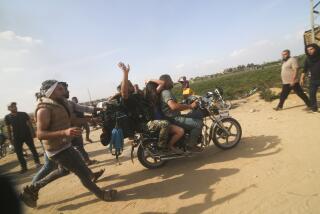Abuse of Civilians Continued After Peace Deal, Report Says
- Share via
JOHANNESBURG, South Africa — Liberia’s government and rebel militias continued raping and abusing civilians and looting property after a peace deal was signed in August, according to a Human Rights Watch report to be released today that documents sexual attacks on girls as young as 5 and women in their 70s.
The slow deployment of United Nations peacekeepers in Liberia and delays in disarmament mean that civilians in areas outside the control of peacekeepers -- particularly rural zones -- are still at risk.
In a pattern that has been repeated in other African conflicts, women and girls have been used as servants or sex slaves, and rape has been wielded as a weapon to subdue civilians, the report said.
Based on interviews with civilians and militia members in October and November, the report offers a haunting portrait of the suffering of ordinary Liberians, victimized time and again as three warring groups took territory from one another. Survivors recalled that rebels and government forces would punish those they believed had supported their enemies, raping women in front of their husbands before killing the men in front of their wives.
The Liberian effort is expected to be the U.N.’s largest peacekeeping mission. But only two-thirds of the 15,000 peacekeepers have been deployed, and only in recent weeks have they moved out of the capital, Monrovia, into major towns; militias hold most of the countryside. The full force is not expected to be in place until March.
The disarming of rebels and government fighters has been twice delayed. Militias, furious over not being paid the full $300 allowance for turning in their weapons, looted and rioted in Monrovia for several days in early December. Disarmament was to resume this week, but it has been put off until February.
The departure of President Charles Taylor paved the way for an accord in August between the government and rebels, ending 14 years of almost continuous war. Taylor, named in a U.N. indictment for war crimes in neighboring Sierra Leone, was granted asylum in Nigeria.
Liberia’s interim government, headed by Gyude Bryant, will seek $400 million to $500 million at a donors’ conference next month in New York to rebuild the nation’s infrastructure.
The timing of the Human Rights Watch report is designed to pressure potential donor countries to contribute more peacekeepers, provide extra support to rebuild and insist on accountability for those responsible for war crimes and abuses.
All sides -- the government and two rebel groups -- were guilty of terrorizing the population, rape and forcing civilians to work for them, the report says.
One rebel group, Liberians United for Reconciliation and Democracy, or LURD, now mainly controls the northeast. A smaller force, the Movement for Democracy in Liberia, or MODEL, controls the southeast. A group of 600 fighters still loyal to Taylor is reportedly holding out in central Liberia.
A woman told Human Rights Watch that LURD fighters repeatedly raped her 9-year-old granddaughter in front of her before they turned on her. In another case, seven LURD members repeatedly raped a young woman before cutting her husband’s throat.
The human rights organization interviewed a 14-year-old girl who was captured and forced to stay with three LURD fighters as a sex slave and servant.
“MODEL called all the people to come back into town and then they started doing all the bad things -- taking people’s things and sleeping with their children,” a refugee told Human Rights Watch researchers. She said a 5-year-old girl was raped by the rebels.
In June, when government forces reoccupied an area of Monrovia after LURD retreated, hundreds of women accused of collaborating with the rebels were raped, the report said.
Corinne Dufka of the watchdog agency’s Africa desk in New York said peacekeepers should patrol rural areas where abuses were frequent.
More to Read
Sign up for Essential California
The most important California stories and recommendations in your inbox every morning.
You may occasionally receive promotional content from the Los Angeles Times.












